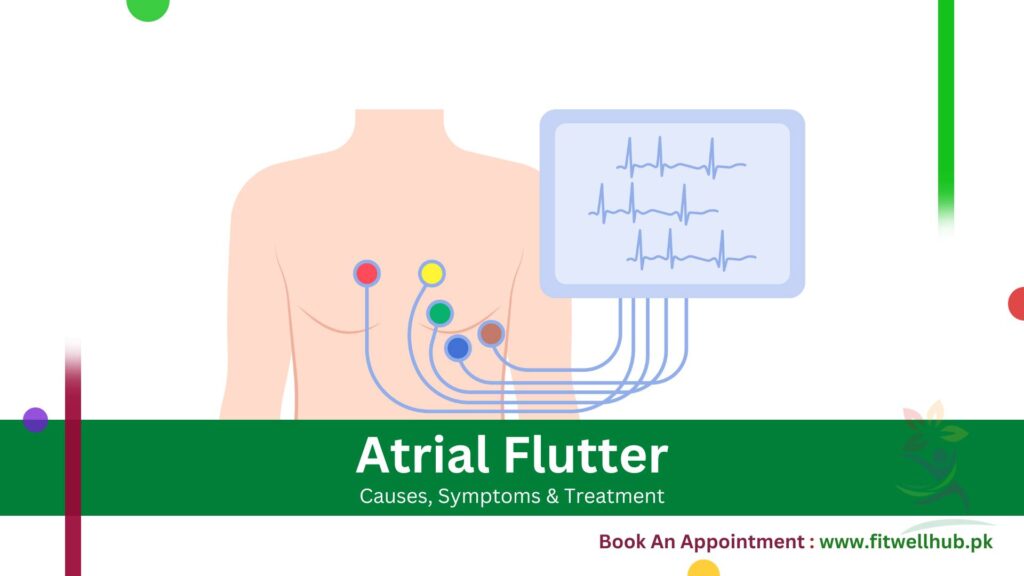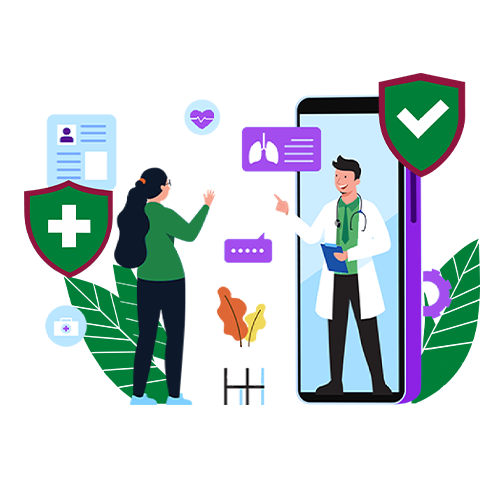Atrial flutter is a type of arrhythmia, or abnormal heart rhythm, in which the two upper chambers of the heart, called atria, beat very rapidly but regularly. This heartbeat is less efficient in blood pumping activities due to disruption of normal, coordinated contraction of the heart. It is similar to atrial fibrillation, but it is more regular and predictable. Without treatment, this condition leads to serious complications such as stroke or heart failure. Fortunately, the condition can be controlled with medication and lifestyle changes and sometimes with some medical procedures like cardioversion.
Quick Links
ToggleIn Pakistan, the prevalence of atrial flutter is estimated to be 30–60 cases per 100,000 people. This rate is lower compared to developed countries, largely due to underdiagnosis and limited access to advanced healthcare facilities. FitwellHub addresses these challenges by introducing Western-standard healthcare facilities in Pakistan with advanced diagnostics and modern treatment protocols, improving outcomes for cardiac patients.
Symptoms of Atrial Flutter
The common symptoms of atrial flutter include:
- Palpitations: Individuals usually experience a rapid or irregular heartbeat, also known as palpitations. It may feel like a thumping or fluttering sensation in the chest.
- Shortness of Breath: Because of the heart’s slow pumping efficiency, it cannot circulate sufficient oxygen to the body, which results in shortness of breath. It occurs during exercising or lying down.
- Dizziness or Lightheadedness: Poor blood circulation to the head may lead to dizziness or lightheadedness. Severe episodes may lead to syncope.
- Chest Pain: A rapid heart rate can cause chest pain or discomfort. This usually occurs due to the increased workload exerted on the heart. This pain is an alarm of other underlying conditions; therefore, it should be taken seriously.
- Fatigue: When the heart struggles to provide the body with oxygen, it may result in a generalized feeling of weakness and exhaustion, even after light exercise.
GET IN TOUCH
Book An Appointment
When to See a Doctor
You should see a doctor if you experience recurrent or persistent rapid heart rate, shortness of breath, chest pains, or dizziness. Sometimes controllable but can predispose to potentially life-threatening complications like a stroke or even heart failure. Immediate treatment is required if you experience chest pain along with shortness of breath or fainting because it can cause a heart attack or another serious condition.
We offer specialized cardiology care and diagnosis services to detect and manage conditions like atrial flutter at FitwellHub. Ready to take the first step toward a healthier, happier you? Book an appointment with us today, and let our experts guide your wellness journey!
Causes
The following are the major causes of atrial flutter:
- Heart Disease: Underlying heart conditions such as coronary artery disease, heart valve issues, or heart failure may damage the electrical system of the heart, which causes atrial flutter.
- High Blood Pressure: Uncontrolled hypertension can cause strain on the heart, increasing the chances of developing atrial flutter or any other arrhythmia.
- Heart Surgery: Individuals who have had heart surgery, particularly valve repair or coronary artery bypass grafting, are susceptible due to the pressure on the heart.
- Chronic Lung Disease: Chronic Obstructive Pulmonary Disease (COPD) or pulmonary hypertension may reduce oxygen supply to the heart, leading to arrhythmias.
- Alcohol and Stimulants: Excessive consumption of alcohol or other stimulants like caffeine, nicotine, or drugs can increase the chances of getting atrial flutter as they overstimulate the heart.
Risk Factors
The following are the primary risk factors for developing atrial flutter:
- Age: Risk increases with age as the heart’s electrical system loses efficiency with aging and the possibility of arrhythmias increases.
- Family History of Arrhythmias: An individual with a family history of arrhythmias has an increased risk of developing heart rhythm problems.
- Heart Conditions: Pre-existing heart diseases like heart valve diseases or previous heart attacks also increase the risk of developing atrial flutter.
- Obesity: Being overweight exerts extra stress on the heart, which leads to developing atrial flutter, mainly when combined with hypertension or other risk factors.
- Diabetes: Congenital heart defects can increase the risk factors due to damage to the blood vessels and the heart because of excessive sugar in the blood.
Complications
If left untreated, atrial flutter can cause some serious complications and includes all of the following:
- Stroke: Atrial flutter increases the risk of blood clot formation in the heart. If these clots travel to the brain, they may cause a blockage that may lead to a stroke.
- Heart Failure: Eventually, the heart muscles weaken due to frequent and less efficient heartbeats associated, leading to heart failure.
- Blood Clots: The blood flow is irregular during atrial flutter, forming blood clots in the atria. This results in complications such as pulmonary embolism.
- Chronic Arrhythmias: If atrial flutter is left untreated, it may eventually cause severe or chronic arrhythmias. For example, Patients have a great risk of developing atrial fibrillation, which requires lifelong management.
- Reduced Quality of Life: Frequently occurring can significantly impair the quality of life for the patient. It can cause severe fatigue & anxiety and reduce the ability to perform daily activities.
Prevention
Atrial flutter can be prevented by managing risk factors and maintaining a healthy heart:
- Control Blood Pressure: Maintain healthy blood pressure through a healthy diet, exercise, and medications. It will reduce the risk of developing atrial flutter and other heart conditions.
- Exercise Regularly: Regular exercise helps strengthen the heart and improve cardiovascular health. It reduces the risk of arrhythmias.
- Limit Alcohol and Stimulants: Limit the use of alcohol and avoid stimulants like caffeine and nicotine. They can trigger the attacks of atrial flutter.
- Quit Smoking: Smoking damages the heart and blood vessels, making it more susceptible to arrhythmias. Quitting smoking helps improve overall heart health.
- Manage Stress: Stress increases heart conditions, including atrial flutter. Reducing stress through stress management techniques such as deep breathing exercises, yoga, or meditation can also help maintain a healthy heart.
At FitwellHub, we offer comprehensive heart health programs to help you prevent and manage conditions.
Diagnosis
The diagnosis of atrial flutter involves several tests to monitor the heart’s functioning and observe abnormal rhythms:
- Electrocardiogram (ECG): An ECG is a test used to record the electrical activity of the heart and show an abnormal rhythm of the atrial flutter condition.
- Holter Monitor: A Holter monitor is a portable device, and it is worn for 24 to 48 hours to continuously record the electrical activity of the heart so that episodes of intermittent that can be identified.
- Echocardiogram: An echocardiogram is used to create images of the heart by sound wave signals. Doctors evaluate the structure of the heart and diagnose the underlying condition, which is responsible for causing atrial flutter.
- Electrophysiological Study: The test involves passing catheters through the blood vessels to the heart to study the electrical pathways and find the source of the abnormal rhythm.
- Blood Tests: Blood tests are used to diagnose an underlying condition like thyroid dysfunction or electrolyte imbalance.
At FitwellHub, we offer advanced diagnostic services for heart conditions. Visit our lab today to learn more or book your tests!
Treatment
The purpose of treatment for atrial flutter is to restore a normal heartbeat, control heart rate, and avoid the complications of the condition.
| Treatment Option | Description |
|---|---|
| Cardioversion | The most common treatment for acute episodes, used to restore normal heart rhythm. |
| Medications | Antiarrhythmic drugs (e.g., amiodarone, sotalol) help maintain normal heart rhythm and prevent recurrence. |
| Ablation Therapy | Uses radiofrequency energy to destroy the small area of the heart causing abnormal electrical signals for long-term relief. |
| Blood Thinners | Anticoagulants (e.g., warfarin, dabigatran) reduce the risk of clot formation and stroke. |
| Lifestyle Changes | Involves dietary improvements, regular exercise, and quitting smoking to prevent future arrhythmias. |
Medications
Some of the medicines prescribed for the treatment of atrial flutter include:
- Antiarrhythmic Drugs: These drugs, like flecainide and amiodarone, are used to restore normal heartbeat and prevent recurrences of atrial flutter.
- Beta-Blockers: Metoprolol and other beta-blockers reduce the burden on the heart by lowering the frequency of episodes and regulating heart rate.
- Calcium Channel Blockers: Calcium channel blockers, like diltiazem, improve blood flow and reduce arrhythmia symptoms by relaxing blood arteries and lowering heart rate.
- Anticoagulants: Anticoagulants, including rivaroxaban or warfarin, are used to prevent blood clot formation, lowering the risk of stroke in individuals.
- Diuretics: Diuretics are sometimes used to treat heart disorders that worsen by lowering blood pressure and reducing fluid retention.
At FitwellHub, our pharmacy offers a wide range of medications for treating related symptoms. Visit our pharmacy to explore available options and consult with our experts.
GET IN TOUCH
Book An Appointment
Frequently Asked Questions (FAQ’s)
It is a kind of arrhythmia or abnormal heart rhythm. During this, the two upper chambers of the heart, called atria, beat very rapidly but regularly.
Although both are types of arrhythmias, atrial flutter has a more regular, organized rhythm, while atrial fibrillation leads to anarchic, chaotic heartbeats.
Atrial flutter may be caused by heart disease, hypertension, chronic respiratory disease, and overuse of alcohol or stimulants.
Depending on the severity of the problem, it is usually managed or cured using treatments including cardioversion, ablation therapy, or medication.
If not treated, this can lead to serious complications like stroke, heart failure, or chronic arrhythmias. Early diagnosis and treatment help keep the patient’s condition under control.














